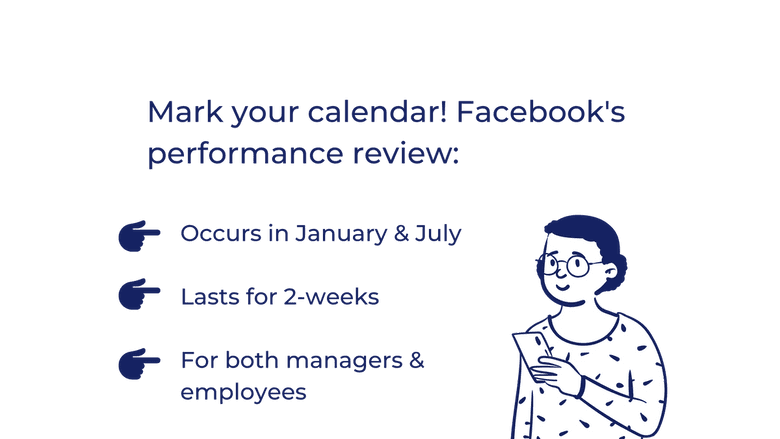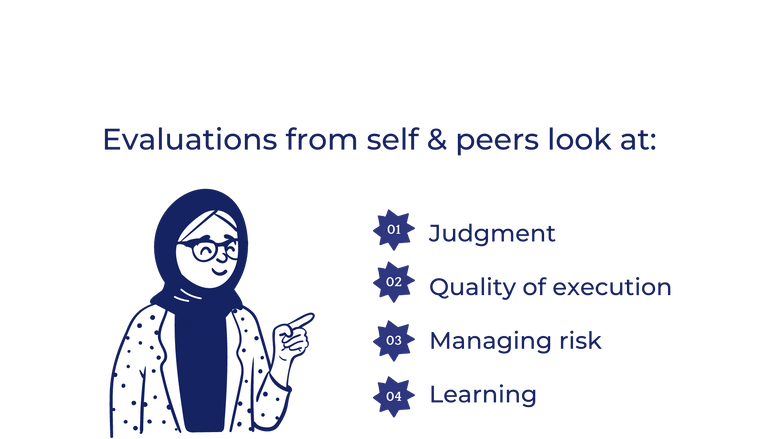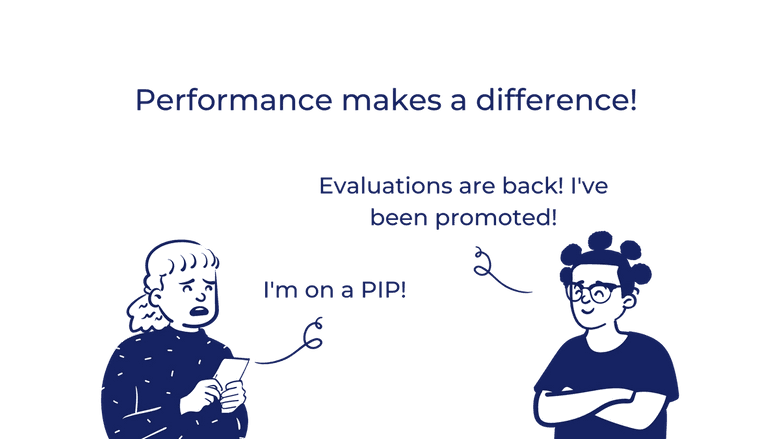Behind Performance Reviews + Bonuses at Facebook
From performance reviews to promotions - we cover career mobility at Facebook
In this article series, we sat down with Facebook Managers to talk about how performance reviews, promotions, and career mobility work at Facebook. Here's what they said.
Timeline

Performance reviews happen twice per year. However, starting in January 2022, they will happen once a year.
In the past, every January (H1) and July (H2), employees at Facebook undertook their performance reviews. However, after the January 2022 cycle, performance reviews will happen yearly. Employee bonus compensation is strictly tied to how they perform in these, so understanding the system before you get hired is critical to balance your future earnings.
The Performance Summary Cycle.
This is a two-week period that kick-starts the review process for both managers and employees.
- Employees will write their own review, ask 4-5 peers for feedback, and write a manager review to complete their own cycle. They will also, of course, write reviews for others who ask for a peer review from them.
- During this time, all Managers and Leads will meet and set a bar based on the challenges the team and company faced in the last 6 months.
👉 Read next: How to hack performance reviews in your favor
How You're Assessed

The performance review looks at 4 factors...
1. Judgement
This focuses on how you handled situations during the review cycle. It includes both successes and failures, emphasizing the decisions you made and why you made them (not just the outcome).
2. Quality of execution
Having great ideas is important, but the emphasis here is on impact, especially on the consistency, quality, and dependability of execution.
3. Managing risk
Every major change has a degree of risk associated with it. This focuses on evaluating how you leaned into and managed risk and whether you made the correct trade-offs from the get-go.
4. Learning
This category focuses on the rate of your skill development, as well as what others learned from you.
Others' feedback impacts your bonus...
How it works
As with any performance review, you will be asked to submit a self-evaluation. Your peers will also write reviews on you. Finally, your manager will review all of this in a process called "calibration" before delivering your final review, which includes your rating and performance bonus.
Managers read every shred of feedback
This is critical to understand: managers have to read all the feedback you got, which is why we recommend making this as predictable as possible by planning your performance review ahead of time.
The outcome of this is called your "Performance Assessment." It's essentially a rating of your performance and an assessment of whether you're ready for a promotion.
Your manager is not the final decision-maker
Managers meet to do calibration. Essentially they look at ratings across teams to make sure ratings are assigned fairly, especially relative to your peers. Here, you might get downgraded, even if you had an initial high rating from your manager and your peers. Essentially, how others feel about working with you in this context matters more than your actual output. Therefore, it's important you adjust for that early on by following our performance review guide.
On Quora, Molly Graham explains calibration quite clearly:
"Facebook has seven performance assessments as well as a guideline for what % of employees should be at each level, however it is explicitly not a forced curve, particularly for small teams. The curve exists to ensure that extraordinary performance is rewarded (I believe the distribution is such that only 2% or less of employees are given the highest rating every cycle) and that if hard conversations need to happen, they happen."
Potential Outcomes

Whatever your recruiter told you about your bonus, it's not a guarantee. Neither are the stock refreshers you might get (which are over $100k for most roles). The outcome of this review process is the key driver to those earnings for everyone inside the organization, from entry-level employees to executives who directly report to Mark Zuckerberg.
Employees walk away from their appraisals with a grade out of seven. The numbers are given definitions from “redefines” to “does not meet.” Low performers will be given a rating like "Meets some expectations" or "Meets most expectations".
Low performers have nowhere to hide
Why? Because all managers in a given org can see the performance stack ranking. Therefore, there's nowhere to run where they won't know your performance history.
What happens? If you are a low performer, this doesn't necessarily mean you'll be fired. There is, however, a high chance you will have a sit down with your manager (and likely HR), during which you'll be offered another role or be put on a PIP (Performance Improvement Plan) for 4 to 6 weeks.
Facebook doesn't have intense guidelines on pushing low performers out like Amazon, however, low performers are dealt with efficiently and packaged out fast. Although it may take a year at many tech giants, low performers at Facebook are managed out in 2-3 months. Facebook also has policies around unregretted attrition and generally reviews departures during every performance review cycle.
Good performers get additional perks
These reviews lead to performance incentives and additional compensation at Facebook. At FAANG in general, this process is very formulaic in order to avoid bias.
- Raises are given once per year, even though there are two review periods
- Stock refreshers happen once per year as well, and they're a relatively large part of compensation
- Promotions can happen twice per year
- Bonuses are awarded at each review cycle (called H1 and H2)
Let's take a deeper look at how stock refreshers work...
When are they granted? Refreshers have a 4-year vesting period, and they can be granted as early as Q1 after your first year with Facebook. This means that refreshers are often awarded at the same time as your initial equity grant, so the years where you're receiving both can be extremely profitable.
How much can you get? As mentioned above, stock refreshers are over $100k for most roles (and this amount is spread out over 4 years). A common misconception is that your refresher amount is based on your initial equity grant, but this is not the case. The exact amount you get at Facebook depends on several factors, including your role, level, location, and performance. If you meet all of the criteria for performance, then you'll get 100% of refreshers for your role/level/location.
👉 Like this article? Join our mailing list below to see when the next one in the series comes out!
The information provided herein is for general informational purposes only and is not intended to provide tax, legal, or investment advice and should not be construed as an offer to sell, a solicitation of an offer to buy, or a recommendation of any security by Candor, its employees and affiliates, or any third-party. Any expressions of opinion or assumptions are for illustrative purposes only and are subject to change without notice. Past performance is not a guarantee of future results and the opinions presented herein should not be viewed as an indicator of future performance. Investing in securities involves risk. Loss of principal is possible.
Third-party data has been obtained from sources we believe to be reliable; however, its accuracy, completeness, or reliability cannot be guaranteed. Candor does not receive compensation to promote or discuss any particular Company; however, Candor, its employees and affiliates, and/or its clients may hold positions in securities of the Companies discussed.
